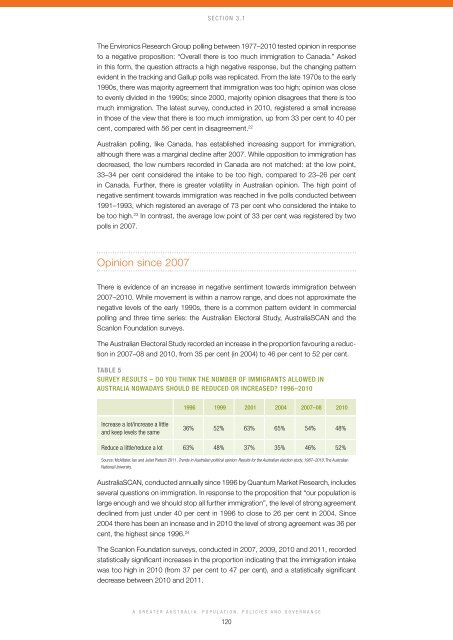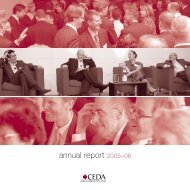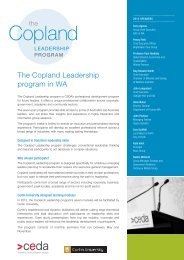A Greater Australia: Population, policies and governance - CEDA
A Greater Australia: Population, policies and governance - CEDA
A Greater Australia: Population, policies and governance - CEDA
- No tags were found...
Create successful ePaper yourself
Turn your PDF publications into a flip-book with our unique Google optimized e-Paper software.
Section 3.1The Environics Research Group polling between 1977–2010 tested opinion in responseto a negative proposition: “Overall there is too much immigration to Canada.” Askedin this form, the question attracts a high negative response, but the changing patternevident in the tracking <strong>and</strong> Gallup polls was replicated. From the late 1970s to the early1990s, there was majority agreement that immigration was too high; opinion was closeto evenly divided in the 1990s; since 2000, majority opinion disagrees that there is toomuch immigration. The latest survey, conducted in 2010, registered a small increasein those of the view that there is too much immigration, up from 33 per cent to 40 percent, compared with 56 per cent in disagreement. 22<strong>Australia</strong>n polling, like Canada, has established increasing support for immigration,although there was a marginal decline after 2007. While opposition to immigration hasdecreased, the low numbers recorded in Canada are not matched: at the low point,33–34 per cent considered the intake to be too high, compared to 23–26 per centin Canada. Further, there is greater volatility in <strong>Australia</strong>n opinion. The high point ofnegative sentiment towards immigration was reached in five polls conducted between1991–1993, which registered an average of 73 per cent who considered the intake tobe too high. 23 In contrast, the average low point of 33 per cent was registered by twopolls in 2007.Opinion since 2007There is evidence of an increase in negative sentiment towards immigration between2007–2010. While movement is within a narrow range, <strong>and</strong> does not approximate thenegative levels of the early 1990s, there is a common pattern evident in commercialpolling <strong>and</strong> three time series: the <strong>Australia</strong>n Electoral Study, <strong>Australia</strong>SCAN <strong>and</strong> theScanlon Foundation surveys.The <strong>Australia</strong>n Electoral Study recorded an increase in the proportion favouring a reductionin 2007–08 <strong>and</strong> 2010, from 35 per cent (in 2004) to 46 per cent to 52 per cent.Table 5Survey results – Do you think the number of immigrants allowed in<strong>Australia</strong> nowadays should be reduced or increased? 1996–20101996 1999 2001 2004 2007–08 2010Increase a lot/increase a little<strong>and</strong> keep levels the same36% 52% 63% 65% 54% 48%Reduce a little/reduce a lot 63% 48% 37% 35% 46% 52%Source: McAllister, Ian <strong>and</strong> Juliet Pietsch 2011, Trends in <strong>Australia</strong>n political opinion. Results for the <strong>Australia</strong>n election study, 1987–2010, The <strong>Australia</strong>nNational University.<strong>Australia</strong>SCAN, conducted annually since 1996 by Quantum Market Research, includesseveral questions on immigration. In response to the proposition that “our population islarge enough <strong>and</strong> we should stop all further immigration”, the level of strong agreementdeclined from just under 40 per cent in 1996 to close to 26 per cent in 2004. Since2004 there has been an increase <strong>and</strong> in 2010 the level of strong agreement was 36 percent, the highest since 1996. 24The Scanlon Foundation surveys, conducted in 2007, 2009, 2010 <strong>and</strong> 2011, recordedstatistically significant increases in the proportion indicating that the immigration intakewas too high in 2010 (from 37 per cent to 47 per cent), <strong>and</strong> a statistically significantdecrease between 2010 <strong>and</strong> 2011.A <strong>Greater</strong> <strong>Australia</strong>: <strong>Population</strong>, Policies <strong>and</strong> Governance120





